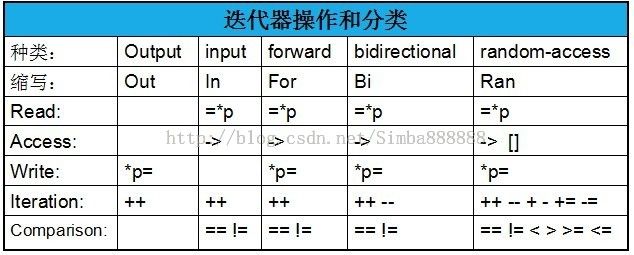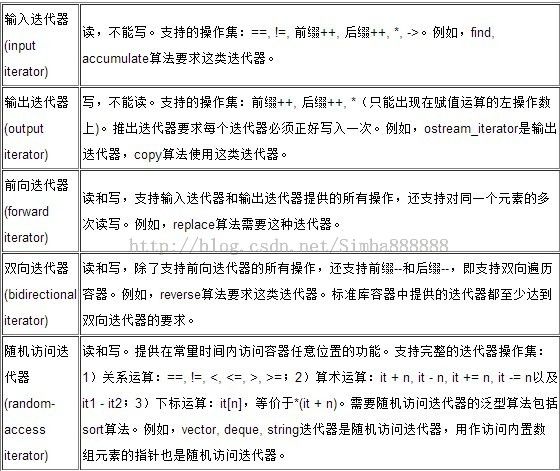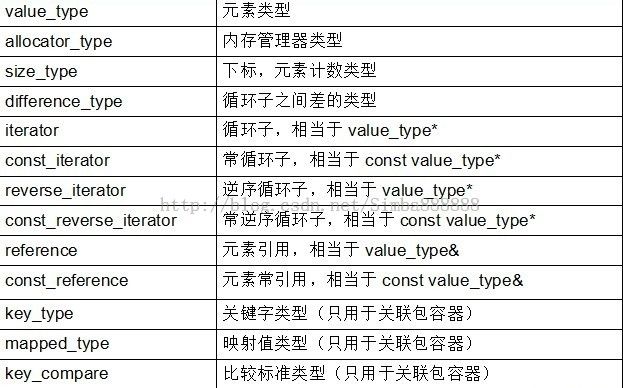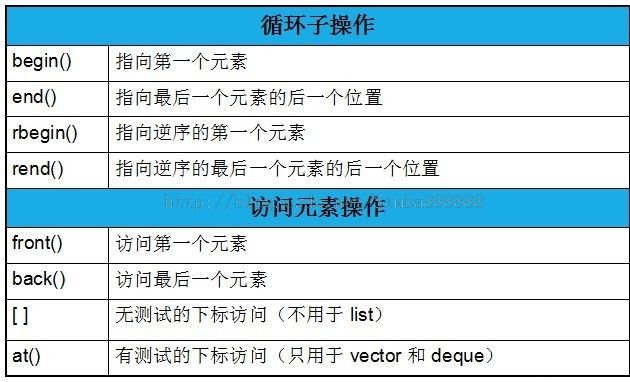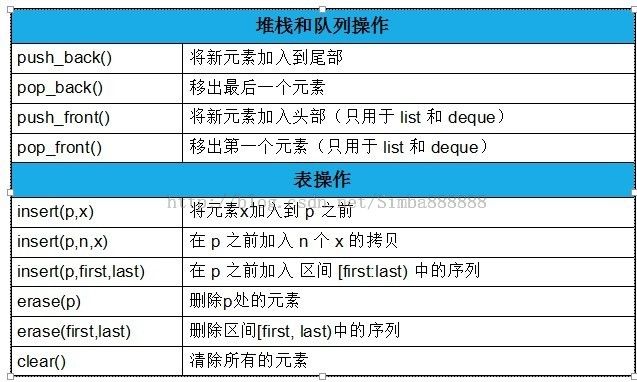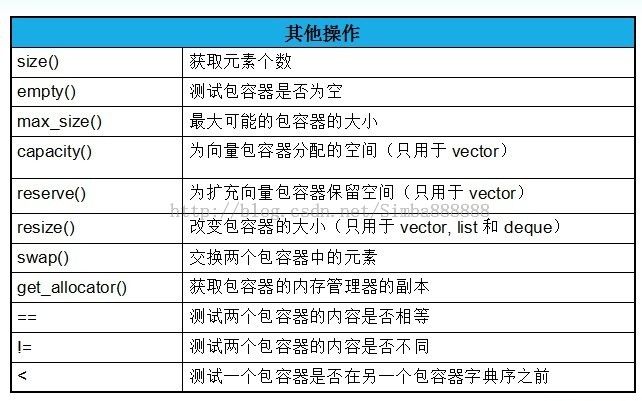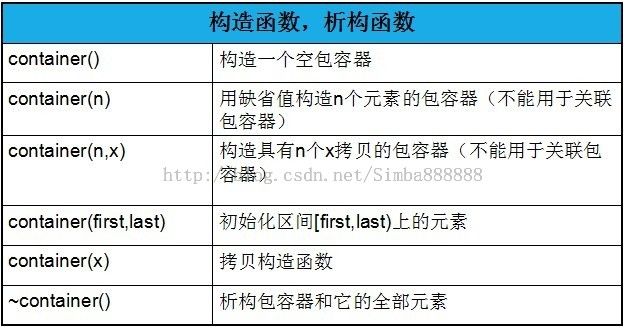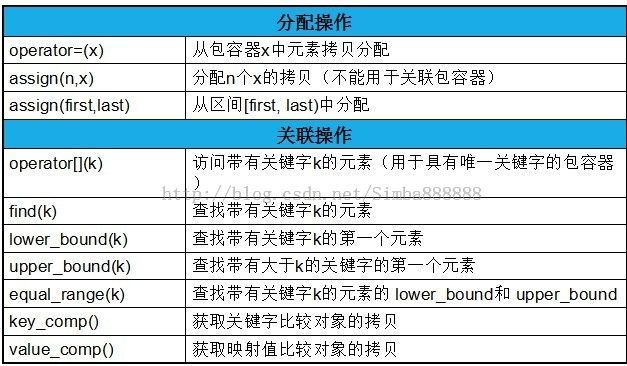从零开始学C++之STL(三):迭代器类vector::iterator 和 vector::reverse_iterator 的实现、迭代器类型、常用的容器成员
一、迭代器
迭代器是泛型指针
普通指针可以指向内存中的一个地址
迭代器可以指向容器中的一个位置
STL的每一个容器类模版中,都定义了一组对应的迭代器类。使用迭代器,算法函数可以访问容器中指定位置的元素,而无需关心元素的具体类型。
下面来稍微看一下vector<class>::iterator 和 vector<class>::reverse_iterator 的源码:
|
1
2 3 4 5 6 7 8 9 10 11 12 13 14 15 16 17 18 19 20 21 22 23 24 25 26 27 28 29 30 31 32 33 34 35 36 37 38 39 40 41 42 43 44 45 46 47 48 49 50 51 52 53 54 55 56 57 58 59 60 61 62 63 64 65 66 67 68 69 70 71 72 73 74 75 76 77 78 79 80 81 82 83 84 85 86 87 88 89 90 91 92 93 94 95 96 97 98 99 100 101 102 103 104 105 106 107 108 109 110 |
template < class _Ty, class _Alloc > class _Vector_val : public _CONTAINER_BASE_AUX_ALLOC<_Alloc> { // base class for vector to hold allocator _Alval protected: _Vector_val(_Alloc _Al = _Alloc()) : _CONTAINER_BASE_AUX_ALLOC<_Alloc>(_Al), _Alval(_Al) { // construct allocator from _Al } typedef typename _Alloc:: template rebind<_Ty>::other _Alty; _Alty _Alval; // allocator object for values }; template < class _Ty, class _Ax > class vector : public _Vector_val<_Ty, _Ax> { // varying size array of values public: .....
typedef _Vector_val<_Ty, _Ax> _Mybase;
typedef typename _Mybase::_Alty _Alloc; //
_Alloc 的定义所在
typedef _Vector_iterator<_Ty, _Alloc> iterator; typedef _Vector_const_iterator<_Ty, _Alloc> const_iterator; // friend class _Vector_iterator<_Ty, _Alloc>; friend class _Vector_const_iterator<_Ty, _Alloc>; typedef std::reverse_iterator<iterator> reverse_iterator; typedef std::reverse_iterator<const_iterator> const_reverse_iterator; ....... }; template < class _Ty, class _Alloc > class _Vector_iterator : public _Vector_const_iterator<_Ty, _Alloc> { // iterator for mutable vector public: typedef _Vector_iterator<_Ty, _Alloc> _Myt; typedef _Vector_const_iterator<_Ty, _Alloc> _Mybase; ....... }; template < class _Ty, class _Alloc > class _Vector_const_iterator : public _Ranit < _Ty, typename _Alloc::difference_type, typename _Alloc::const_pointer, typename _Alloc::const_reference > { // iterator for nonmutable vector public: ..... typedef typename _Alloc::pointer _Tptr;
typedef random_access_iterator_tag iterator_category;
typedef _Ty value_type; typedef typename _Alloc::difference_type difference_type; typedef typename _Alloc::const_pointer pointer; typedef typename _Alloc::const_reference reference;
typedef const value_type _FARQ *const_pointer;
typedef const value_type _FARQ& const_reference; .... _Tptr _Myptr; // offset of element in vector }; template< class _Ty> class allocator : public _Allocator_base<_Ty> { // generic allocator for objects of class _Ty public: ...... typedef _Allocator_base<_Ty> _Mybase; typedef typename _Mybase::value_type value_type; typedef value_type _FARQ *pointer;
typedef value_type _FARQ& reference;
... }; // TEMPLATE CLASS _Allocator_base template< class _Ty> struct _Allocator_base { // base class for generic allocators typedef _Ty value_type; }; template< class _RanIt> class reverse_iterator : public _Revranit<_RanIt, iterator<...> > { // wrap iterator to run it backwards ........ typedef reverse_iterator<_RanIt> _Myt; typedef _RanIt iterator_type; .............. }; // TEMPLATE CLASS _Revranit template < class _RanIt, class _Base > class _Revranit : public _Base { // wrap iterator to run it backwards .... protected: _RanIt current; // the wrapped iterator }; |
typedef _Vector_iterator<_Ty, _Alloc> iterator; 可知iterator 只是类型定义,而_Vector_iterator 又继承自 _Vector_const_iterator,这
个类有个成员_Tptr _Myptr; 进一步看_Tptr 可以知道类型是value_type*, 假设现在使用的容器是vector<int>,那么value_type 也就是
int, 那么实际上iterator 内部就只有一个int* _Myptr; 成员而已。即包装了一般的指针。很明显地,iterator 类里面一定重载了
operator*, ->, ++, -- 等操作符,而这些操作符实际上还是对一般的指针_Myptr 进行操作。举operator* 来说:
|
1
2 3 4 5 6 7 8 9 10 11 12 13 |
// iterator
reference
operator*()
const
{ // return designated object return ((reference) **(_Mybase *) this); } // const_iterator reference operator*() const { // return designated object ..... return (*_Myptr); } |
this 在这里是iterator*, (_Mybase *)this就是const_iterator*,*(_Mybase *)this就是const_iterator 对象,**(_Mybase *)this就是调用const_iterator
的 operator*(), 即 返回*_Myptr,即指向的元素,iterator 的 operator* 返回的是引用 reference ,这其实是在allocator 类中定义的const_reference,
即 const value_type&, 假设现在的容器是vector<int> ,那么返回的也就是const int& ,即不能将其作为左值进行赋值,但能作为右值,如 cout<<*it;
同样地, iterator 的 operator++ 也调用了 const_iterator 的 operator++, 在函数里面也是执行 ++_Myptr; 的操作,返回的是const_iterator& ,而从
iterator 的 operator++ 返回的是iterator& 。
typedef std::reverse_iterator<iterator> reverse_iterator; 再来看 reverse_iterator,继承自_Revranit, 这个类有个成员 _RanIt current;
也就是说有个 iterator 类成员,即包装了一个iterator 类成员,从这个角度看,reverse_iterator 也可以算是一个适配器,利用 iterator
类的一些操作完成自身的功能。
××××××××××××××××××××××××××××××××××××××××××××××××××××××××××××××××××××××××××××××××××××××××××××××××××××
上面介绍的是vector::iterator ,比如 list::iterator 实现是类似的,内部成员也是一个指针,不过是指向Node 结点的指针,如:
_Nodeptr _Ptr;// pointer to node
×××××××××××××××××××××××××××××××××××××××××××××××××××××××××××××××××××××××××××××××××××××××××××××××××××
简单的测试程序如下:
|
1
2 3 4 5 6 7 8 9 10 11 12 13 14 15 16 17 18 19 20 21 22 23 24 25 26 27 28 29 30 31 32 33 34 35 36 37 38 39 40 41 42 43 |
#include <vector>
#include <list> #include <iostream> using namespace std; int main( void) { vector< int> v; v.push_back( 1); v.push_back( 2); v.push_back( 3); vector< int>::iterator it; for (it = v.begin(); it != v.end(); ++it) { cout << *it << ' '; } cout << endl; vector< int>::reverse_iterator ri; for (ri = v.rbegin(); ri != v.rend(); ++ri) { cout << *ri << ' '; } cout << endl; list< int> l; l.push_back( 1); l.push_back( 2); l.push_back( 3); list< int>::iterator it2; for (it2 = l.begin(); it2 != l.end(); ++it2) { cout << *it2 << ' '; } cout << endl; return 0; } |
二、迭代器的类型 iterator_category
输入迭代器
可以用来从序列中读取数据
输出迭代器
允许向序列中写入数据
前向迭代器
既是输入迭代器又是输出迭代器,并且可以对序列进行单向的遍历
双向迭代器
与前向迭代器相似,但是在两个方向上都可以对数据遍历
随机访问迭代器
也是双向迭代器,但能够在序列中的任意两个位置之间进行跳转
下图是不同类型的迭代器能够实现的操作:
1、The standard-library container classes all support bidirectional iterators.
of curse the const iterator only meets the requirements for input iterators.
2、The vector and deque iterators are random-access iterators. however, the list iterator is not; it supports only bidirectional iterators.etc,it does not support [] operation.
3、If c is a container that supports push_back, then back_inserter(c) is an output iterator that meets no other iterator requirements.
4、The stream iterators are defined in the <iterator> header, the istream_iterator<class name> meets the requirements for input iterators; the ostream_iterator<class name> meets the requirements for output iterators.
we can use it like this:
|
1
2 3 4 5 6 7 8 9 10 11 |
vector<
int> v;
// read ints from the standard input and append them to v // istream_iterator<int>() indicate "EOF" copy(istream_iterator< int>(cin), istream_iterator< int>(), back_inserter(v)); // write the elements of v each seperated from other by a space copy(v.begin(), v.end(), ostream_iterator< int>(cout, " "); // no seperation between elements! copy(v.begin(), v.end(), ostream_iterator< int>(cout); |
不同的迭代器支持不同的操作集,而各种算法也要求相应的迭代器具有最小的操作集。因此,可以将算法的迭代器分为下面五类:
三、常用的容器成员
下面列举的成员中,有一些是所有容器共有的,有些是特有的,注意区别:
四、迭代器失效的问题(摘自 http://blog.csdn.net/hackbuteer1/article/details/7734382)
vector迭代器的几种失效的情况:
1、当插入(push_back)一个元素后,end操作返回的迭代器肯定失效。
2、当插入(push_back)一个元素后,capacity返回值与没有插入元素之前相比有改变,则需要重新分配整个容器,此时first和end操作返回的迭代器都会失效。
3、当进行删除操作(erase,pop_back)后,指向删除点的迭代器全部失效;指向删除点后面的元素的迭代器也将全部失效。
deque迭代器的失效情况: 在C++Primer一书中是这样限定的:
1、在deque容器首部或者尾部插入元素不会使得任何迭代器失效。
2、在其首部或尾部删除元素则只会使指向被删除元素的迭代器失效。
3、在deque容器的任何其他位置的插入和删除操作将使指向该容器元素的所有迭代器失效。
list的迭代器好像很少情况下会失效,也许就只是在删除的时候,指向被删除节点的迭代器会失效吧,其他的还没有发现。
先看两条规制:
1、对于节点式容器(map, list, set)元素的删除、插入操作会导致指向该元素的迭代器失效,其他元素迭代器不受影响。
2、对于顺序式容器(vector)元素的删除、插入操作会导致指向该元素以及后面的元素的迭代器失效。
众所周之当使用一个容器的insert或者erase函数通过迭代器插入或删除元素"可能"会导致迭代器失效,因此建议我们获取insert或者erase返回的迭代器,以便用重新获取新的有效的迭代器进行正确的操作:
代码如下:
- iter = vec.insert(iter);
- iter = vec.erase(iter);
参考:
C++ primer 第四版
Effective C++ 3rd
C++编程规范

